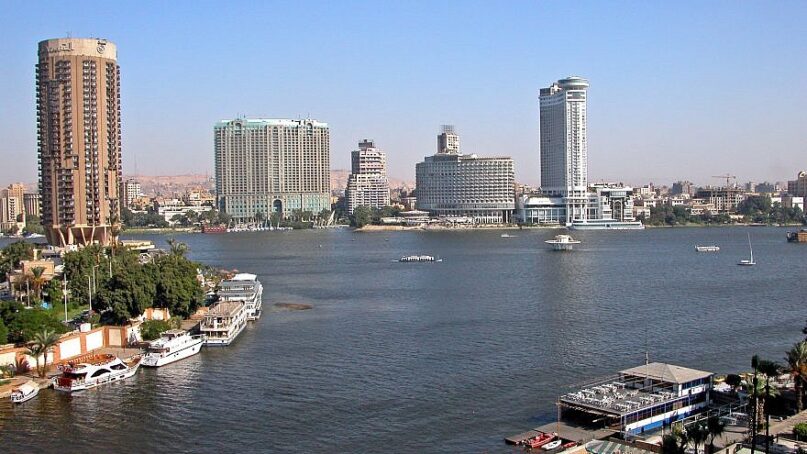
By Simon Sherman
(JNS) The vast majority of Arabs oppose normalization of relations with Israel, recently released poll results from the 2022 Arab Opinion Index show.
When asked, “Would you support or oppose diplomatic recognition of Israel by your country?” 84% of respondents said no. This lack of support for normalization of relations was consistent across the 14 countries surveyed.
The most pro-Israel country, Morocco, saw only 20% support for normalization. Algeria stood out as the most anti-Israel country, with 99% of respondents opposing normalization. Saudi Arabia was an extreme outlier, with 57% choosing not to answer the question. This trend is supported by other surveys such as the Arab Barometer poll, which showed 13% support for normalization.
According to Dana El Kurd, a nonresident fellow at the Arab Center Washington DC, the center has seen little change in support for normalization in the Arab world since it began conducting the polls in 2014.
Support for the Palestinian cause remains strong among the Arab population, with little change over time. The poll found that 76% of respondents said they supported “the Palestinian cause,” a slight drop from 2020. According to Khalil Jahshan, the executive director of the Arab Center Washington, “The predominant majority of Arabs see [the Israeli-Palestinian conflict] as their issue.”
Israel as threat
The poll further revealed that a majority of surveyed Arabs see Israel as a threat to the stability and security of the region. Eighty-four percent of respondents indicated that they see Israel as a threat, while 78% see the United States and 57% see Iran as a threat.
The perceptions of the threat to the stability and security of the region vary extremely from country to country. Almost half of Iraqis believe that Iran is the main threat to the security of their country. The bloc seeing Israel as the biggest threat to their respective countries is made up of Jordan, Lebanon, Egypt and Algeria.
The Arab Opinion Index is conducted by the Arab Center Washington DC and the Arab Center for Research and Policy Studies in Doha, Qatar, and is the largest public opinion survey in the Arab world. The 2022 survey was based on face-to-face interviews conducted between June and December 2022 with 33,300 individual respondents in 13 Arab countries: Algeria, Egypt, Iraq, Jordan, Kuwait, Lebanon, Libya, Mauritania, Morocco, Qatar, Saudi Arabia, Sudan and Tunisia. The survey also polled Arabs living in Judea and Samaria, commonly known as the West Bank.
The survey addressed important issues such as U.S. foreign policy, recognition of Israel, religion, culture, economic conditions and democracy. Sampling followed a randomized, stratified, multi-stage, self-weighted clustered approach, giving an overall margin of error between +/- 2% and 3% for the individual country samples.
The 2022 Arab Opinion Index poll also delved into the political and economic conditions in the surveyed countries. The poll found a large range of responses by region, with the Gulf states overall having a positive view of their government, while most of the other countries had around 70% reporting a negative view of their political and economic situation. The poll also addressed the issue of corruption, with the great majority (73%) of respondents indicating that it is widespread.
Finally, the poll highlighted the growing role of social media in the region, with a steep rise in its use to interact with political issues.
Despite the consistent finding that the majority of surveyed Arabs oppose normalization with Israel, the 2022 Arab Opinion Index survey revealed indications of a possible warming attitude towards Israel over the past decade.
Twenty percent of Moroccans
For example, 20% of Moroccans surveyed in 2022 favored diplomatic recognition of Israel, a significant increase from the 4% recorded in the 2019-2020 survey. This shift in attitude may be linked to Morocco’s participation in the Abraham Accords, the historic treaty that normalized relations between Israel and several Arab countries, which Morocco joined in December 2020.
Sudan, another participant in the Abraham Accords, also showed higher than usual support of normalization with Israel, at 18%. The other Arab signatories to the Abraham Accords, Bahrain and the United Arab Emirates, were absent from the survey.
Furthermore, the survey showed that there has been a three-percentage point drop in support for “the Palestinian cause” and a six-percentage point drop in perception of Israel as a regional threat overall, since 2018.
Nevertheless, experts believe that the overwhelming opposition to normalization with Israel in the Arab world will not hinder efforts towards normalization.
Jahshan said that he did not expect the poll to have any effect on Israel’s normalization goals.
“Having known [Prime Minister Benjamin] Netanyahu…I don’t think he is particularly impressed with this,” he said, adding further, “He thinks its doable, and he’s going to pursue it.”
On the other hand, certain top Israeli diplomats have said that Arab public opinion may be a real obstacle to normalization.
Ron Dermer, Israel’s minister of strategic affairs and one of the chief architects of the Abraham Accords, has on many occasions emphasized the importance of cultivating positive Arab public opinion in order to further normalization efforts, particularly in the Gulf states. In an interview in September 2021, Dermer said that social pressure in the Arab world is one of the central factors that has blocked Arab governments from closer ties with Israel.
MAIN PHOTO: Cairo, Egypt. Credit: Flickr via Wikipedia.








 Southern New England Jewish Ledger
Southern New England Jewish Ledger










